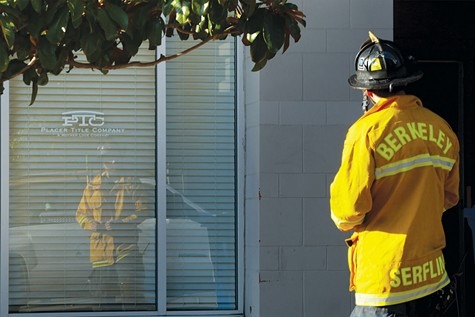Saving Heroes

Photo: Aashna Malpani
Limited services for first responders dealing with mental trauma
June 25, 2020
In 2017, a retired police captain woke up in the middle of the night with his gun in his hand, his wife’s shriek breaking the 3am silence. The metal felt cold against his sweaty palm, his heart beat like it was ready to explode. He was crouched in attack mode, his shoulders tensed together, ready for a fight. He doesn’t remember running around the house with his weapon, believing there was an intruder somewhere.
According to his wife, this wasn’t the first time it had happened.
The captain—who asked his name not be used because of the sensitivity of his medical condition—worked at a mid-sized, East-Bay police agency and had long suffered from night terrors, extreme PTSD and alcoholism during his 25-year career. But the mental health services that once kept his conditions at bay were shut down—like so many other businesses and services—in the wake of Covid-19 stay-at-home orders.
The West Coast Post-traumatic Retreat Center in Napa County that the former captain relied on to get his life back on track specifically serves first responders. It closed its doors on March 13 to help curb the spread of the disease.
“I think if he didn’t go to this program, he would have died,” his wife said. “You have to hit a bottom to get there. Somebody drives you there.”
First responders have long been known to suffer from mental trauma, with law enforcement officers especially vulnerable to depression and suicide. And while first responders now work on the front lines of the pandemic, there is renewed concern over their mental health and the safety of their loved ones. With state-wide shelter-in-place orders, these essential workers have nowhere to go to receive the mental-health help they need, particularly for the heightened trauma they’re now facing—risking exposure to Covid-19 every day while out on patrol or responding to calls for service, sometimes without the necessary personal protective equipment needed to protect themselves.
According to the International Association of Chiefs of Police and the Center for Evidence-Based Crime Policy at George Mason University, around 130 agencies, of the nearly 1,000 agencies that responded to the survey, reported their ability to provide PPE for their officers as “poor” or “very poor.” Their survey responses were collected in mid-to-late March, just after the president declared a national emergency and after California’s shelter-in-place ordinance went into effect.
At that time, around 70 agencies reported their ability to manage exposed officers as poor, and a little over 25 percent did not report having a contingency plan or strategy in place to handle a significant number of officers on sick leave or in quarantine.
Which, according to data collected by The National Police Foundation, is happening all too frequently. According to their Covid-19 real-time data dashboard, California has a higher rate of exposures and diagnoses than any other state. More than 21 percent of reported personnel—nearly 4,000 people—have been exposed, with 0.4 percent diagnosed.
First responders risk Covid-19 exposure every day, with dire mental-health implications. And this population is already more vulnerable than others.

According to Blue H.E.L.P., a nonprofit aimed at mitigating the stigma of mental health in police departments, 228 officers committed suicide nationalwide in 2019, an increase from 172 the year before. During the years Blue H.E.L.P.’s been collecting data, more police officers in the United States have died by suicide than by all line-of-duty deaths combined.
Which is what makes centers like WCPR so vital to this community. WCPR relied heavily on group therapy. Using what they call a tri-pronged system, the facility relied on licensed clinicians, chaplains and peers. Peers—people who’ve been through the program before—were hailed as the most pivotal parts of the program, said Cyndee Thomas, chaplain director at WCPR.
An LAPD homicide detective, who asked to remain anonymous, was on the WCPR waitlist. He was specially interested in its peer support, to help him cope with his alcoholism and recurring nightmares. His most recent nightmare occurred three weeks ago, when he awoke in a sweat, his body tense, recovering from the mental image of a young officer he’d trained who died brutally in a car chase just a month into the force.
“He was one of my favourite trainees,” he said. “The car wrapped around the telephone pole and he died. That was 18 years ago and it’s still with me.”
The detective tried seeking help during his 20 years on the force, but found therapists were unable to help him.
“A lot of the time it makes it worse,” he said, regarding usual therapy.
Being in law enforcement is a “unique experience,” something that is not easily or completely understood by the general public. Opening up to first responders who have lived a similar reality can help facilitate the healing process.
“What’s the backup plan?” he asks, as mental health facilities like WCPR shut down because of shelter-in-place. The detective shares his concern that first responders need more support than ever during Covid-19. He believes suicides, alcoholism and substance abuse are going to skyrocket; that the numbers and overall impact will only be visible in hindsight.
Preventing exposure among personnel is already difficult enough, even more so when departments are hindered by a lack of PPE. According to the NPF, nearly 28 percent of personnel in California have reported insufficient access to PPE. And even more concerning is the lack of information being provided to law enforcement.
The California Police Chiefs Association surveyed the 322 law enforcement agencies throughout the state during the last week of April, and more than a third responded. Of the respondents, 30 percent said they were not receiving information from health officials on Covid-19 cases in their city. Meaning, several law enforcement agencies in California are being forced to send their officers to answer calls without knowing whether or not the call is related to someone Covid-19 positive, potentially and unknowingly risking them exposure. And, half of all respondents said they have had to quarantine at least one officer due to Covid-19.
Without access to facilities like WCPR, these first responders have to handle the anxiety from being put in these stressful situations on their own.
“This is not a luxury thing,” said the detective, “there are a lot of guys out there who’re really worried [that they’re] at the end of their rope and are needing to get into a facility.”
The WCPR retreat was crucial, as attendees were physically surrounded by peer-support and constant check-ins. WCPR is a no-substance zone, and those dealing with addiction were physically removed from drugs and alcohol.
In order to provide some relief, WCPR has been moderating online video conferencing where first responders can find a safe space to talk. Not meant to be a replacement for the retreat, the virtual platform functions as an SOS helpline.
At the retreat, the captain found clients who’d been in similar situations as him and were willing to talk about their experiences. They understood his trauma.
“I felt an affinity for them almost immediately, which happens at WCPR,” he recalled.
He attributes recovery and bonding to their physical presence, a connection missing in online meetings.
Other types of first responders are also at a high risk for death-by-suicide. The Firefighter Behavioral Health Alliance recorded 139 firefighters and EMT suicides last year, and nearly 40 deaths this year so far.
“Covid-19 is just the beginning of a lot of issues that my brothers and sisters will be dealing with,” Jeff Dill, founder of the FBHA, said.
Adding to existing PTSD and depression, first responders are expected to face compassion fatigue, a higher risk of exposure to Covid-19 and the stress of potentially infecting their own families.
David Bevers, an engineer and paramedic with the Sacramento Fire Department, said paramedics are under intense pressure in the midst of the pandemic. Stress already occurs from working on the front lines, but the added tension around protecting against a deadly contagion makes first responders particularly vulnerable.
“We’re fighting the invisible war,” Bevers said.
Bevers emphasized the need for first responders to deal with their mental trauma, which if left untreated, often worsens into more dangerous health situations. Symptoms of mental trauma begin subtly, with a person acting distant. Feelings of isolation evolve into substance abuse as a method of suppressing trauma, which can eventually lead to addiction. State-wide shelter-in-place orders prevent first-responders access to the typical recreational outlets, such as going to the movies or shopping, that once helped them cope with daily job pressures.
Bevers recalled his own experience attempting to resuscitate an unresponsive infant, who later died in the hospital. At the time, he had his own newborn at home. Soon after, Bevers realized he had to avoid developing attachments to patients.
“If I were to look at this kid, or look at the patient, and see somebody I know, or relate this to my kid or my family, that is what would tear me up,” Bevers said.



